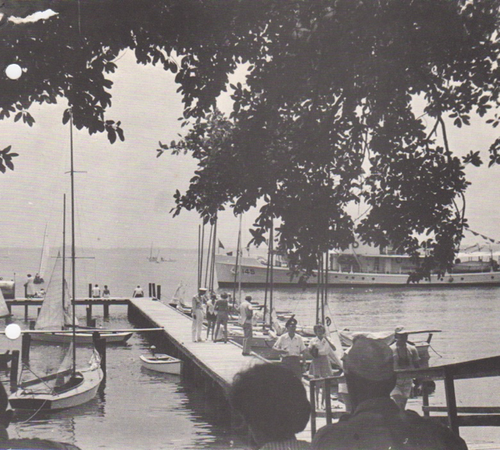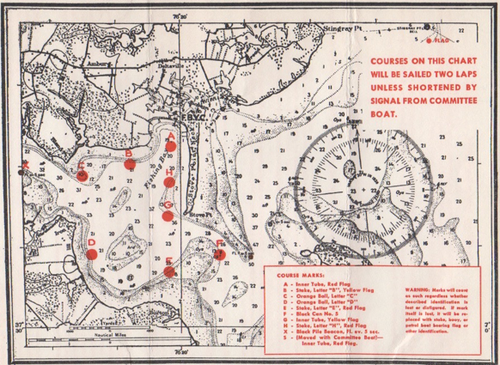Last summer, I found myself reminiscing with a new member, Scott Vail, about the way our Annual Regatta has changed since the 1960s. Scott is the nephew of legendary Norfolk sailor, Dinky Vail, who dominated his class in regattas during this era. Here are a few of our observations…
As an example, the 23rd Annual Sailing Regatta is chosen as typical of the event at that time. This Regatta was held over Friday through Sunday, August 17-19, 1962 for which there is an existing race program in our archives.

Back then, the Annual Sailing Regatta combined races for Large Boat Classes (the terminology for Cruising and other Offshore classes at the time) and for Small Boat Classes (One-Designs and Handicap). The Large Boat Class schedule included two races, a feeder race of about 29 miles from Hampton Roads to FBYC on Friday and a Chesapeake Channel Race of over 15 miles in the Chesapeake on Saturday.
The Small Boats raced on Saturday and Sunday around a series of fixed government and club markers in Fishing Bay as illustrated on the nearby chart that appeared on the back of the 5-page program. There was only one course for all fleets, juniors and seniors. Two races were scheduled on Saturday and one on Sunday. Curiously, after the first race in the morning, competitors were sent ashore to eat lunch. Those who couldn’t find space at the pier hauled their boats up on the club beach or neighboring beaches with scant regard for the welfare of their slick racing bottoms. Afterwards it was back for the second race. Hopefully the wind would not be light for the dinghy races as there was a strict time limit of, get this, 2 ½ hours after the start of the race.
Some other interesting differences included the use of the old White, Blue, and Red shapes to signal the class starts. (Your Historian often wonders why this simple, elegant, and traditional system was abandoned in favor of the system presently employed.) Also, there were few if any safety requirements for participating boats. Only two types of flotation devices, the bulky Mae West type life jacket and flotation cushions, were available then. Many boats carried neither with impunity to demonstrate their machismo. And the cumbersome scoring system was based on high points, with one point awarded for the number of boats beaten in the race with an extra ¼ point awarded to the first place winner.

Finally, there were the Saturday night parties where the over consumption of adult beverages was de rigueur and raucous behavior extended into the wee hours of the morning. Today’s Regatta parties are church picnics by comparison. The old style festivities peaked during the 1959 Regatta when near riotous incidents required a visit from the Middlesex County Sheriff and the Club was placed on ABC Board probation. Thereafter, for perhaps more than five years, the Club embarked on a Security Program to hire a guard during the Regatta and to require “guests, participants, and members to log in with the Security Officer, and obtain and wear identification badges at all time when on Club property.” These quibbling measures, however, did little to end the merriment that continued to characterize our Regatta parties, albeit in a more subdued fashion.
Today, of course, we split the Offshore and One-Design Regattas over two weekends in late summer. The O/D Regatta features three or four separate racecourses. Both offer multiple numbers of races on each race day and use movable marks requiring constant adjustments with fluctuations in the wind. As a result, significantly more volunteer effort is required today to stage the Annual Regattas than back in the hazy past. One thing that has not changed is FBYC’s commitment to host the finest Regattas on the Bay!
The Regatta photo that accompanies this article appeared on the cover of the 1962 Yearbook but without attribution or explanation for the huge yacht that appears in the background. Your Historian vaguely recollects that this may be a Coast Guard vessel invited to attend our 1961 or earlier Regatta. However, old timers with a better memory are invited to help me correct the record.
***